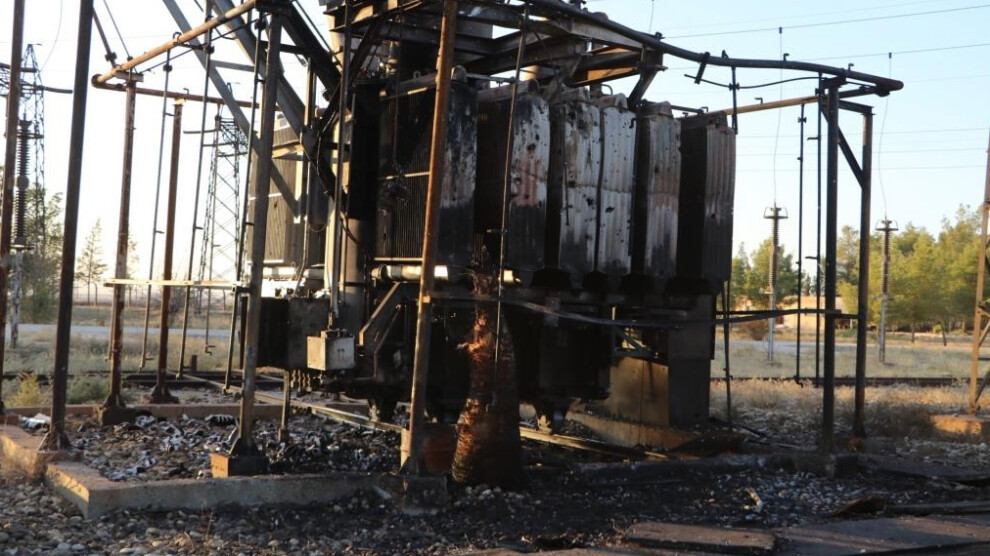The Turkish state has been carrying out genocidal attacks against the regions of North and East Syria since 5 October using the guerrilla action in Ankara on 1 October as a pretext.

On 5 October, Turkey carried out its heaviest attacks on civilian infrastructure in northeastern Syria for a long time. Numerous armed drones and fighter jets entered the autonomous region’s US-controlled airspace and bombed vital facilities such as substations and electricity distribution stations, water pumping stations, oil and gas production facilities as well as petrol stations, dams, factories, a camp for displaced persons and several villages. Among other things, the energy infrastructure of Hesekê, Qamişlo and Amûdê was destroyed, and large parts of the regions are cut off from electricity.
The wave of attacks came after Turkish Foreign Minister Hakan Fidan named “the infrastructure of the Kurdistan Workers’ Party (PKK) and the People’s Defence Units (YPG) in Iraq and Syria as legitimate targets” and claimed that the two guerrilla fighters involved in the sacrificial action against the Interior Ministry in Ankara on 1 October had been trained in northern Syria and had entered Turkey from there via the highly secured border. The authorities and defence forces of the Autonomous Administration of North and East Syria (AANES) as well as the PKK rejected this account as a “lie” and spoke of a constructed pretext to launch the war of aggression against northern and eastern Syria that Turkey had been planning for a long time. On Wednesday, the region of north-eastern Syria was targeted by heavy Turkish drone attacks. In the days before, the air force of Turkey carried out several waves of attacks in Southern Kurdistan (Kurdistan Region of Iraq, KRI).
As a result of the attacks by the Turkish state, the main power generating facility and 4 electric distribution networks in Cizire Region went out of service. The power supply to medical institutions, bakeries and water stations, which provide service to 2 million people in the region, was completely cut off, leaving people without water, electricity and gas. Services came to a stopping point in dozens of hospitals, health care centers and clinics. According to initial findings, the attacks caused damage of over 56 million dollars to the station.
During the brutal attacks on the region that continued unabated for four days, the al-Suwaydia (Siwêdiyê) power generating facility, adjacent to the Rimelan field and the gas plant, was also struck by a Turkish UAV, causing significant damage to the turbines within the facility. This marks the fifth time the Turkish occupation has targeted this facility, resulting in severe structural impairment.
The station, which provides electricity to all the water stations in the cities in the region, was struck by Turkish fighter jets at 10:45 on 6 October. After a total of 11 attacks, the station was largely left out of service, leading to a lack of electricity, water and gas in the region. The power station, which is considered the largest station in the Cizire Region in North-East Syria, had also been subjected to a Turkish bombing on October 23, 2022, which resulted in 40 percent damage to the station.
Mistefa Mamxêr from the management of the Suwaydia station, who was at the station during the Turkish bombing, spoke to ANHA and said: “The bombing started a fire, so we tried to take the flames under control until the fire brigade arrived and managed to put out the fire. Shortly after, the station was targeted by another attack which was actually meant to destroy the two main turbines. During the attacks, the four turbines designated for power generation were bombed. At the moment, the station is 80 percent out of service and we have begun to repair it.”
5 central hospitals, 15 private hospitals and 35 healthcare centers in Derik, Qamışlo, Amude, Hesekê and Shaddadi have also been deprived of electricity supply due to the Turkish aggression. Despite the usage of generators to overcome the problem for the time being, it is becoming more challenging every day to provide services in the mentioned locations.
The water stations in the Cizire Region operate with water and most of them provide electricity from the Suwadiya station. With the latest disruption of power supply, most of the water pumping stations have also gone out of service.
The Suwadiya station also serves as the main distribution center of gas to civilian settlements and institutions in the region. On the 5th of October, Turkish warplanes bombed the gas plant at the station, which produces and distributes about 13,000 cylinders of gas per day. The attack is expected to create a huge problem with the procurement of gas.
On the other hand, according to the Energy Department of the Euphrates Region, as many as 100 villages to the west of Ain Issa have been left without electricity after the Turkish bombing of power stations in the region. The wave of attacks in this region also targeted the village of Ebu Sira, where the water supply to the cement plant was cut off. The power line at the cement plant provided electricity to the villages to the west of the district and the district of Jirin.








Leave A Comment